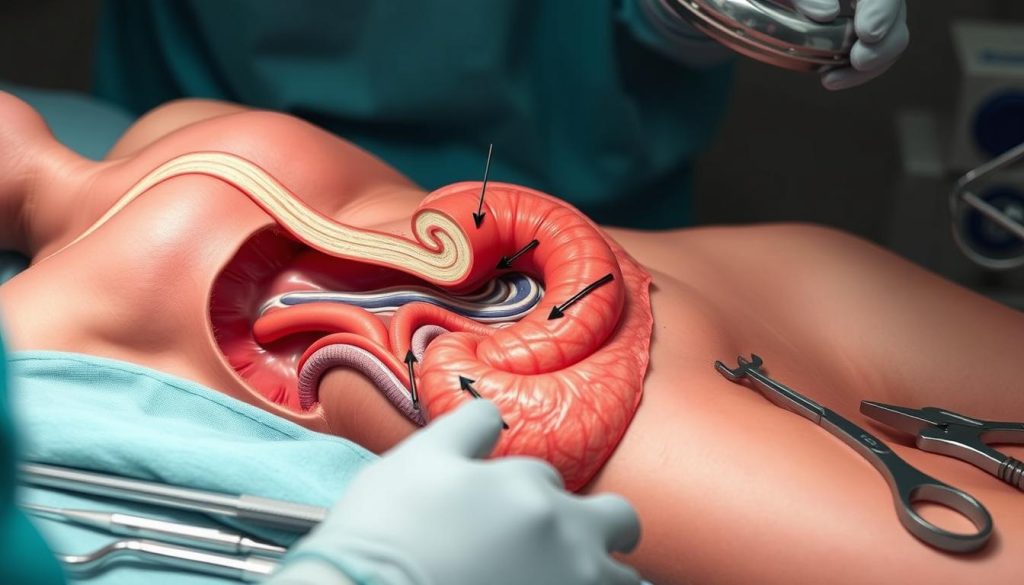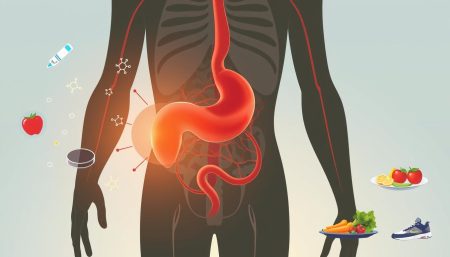Hiatal hernia surgery is a common way to fix a problem where part of the stomach bulges through the diaphragm. This article will guide you through the process of hiatal hernia repair. We’ll talk about the different surgeries, what to do before, and how to recover.
Knowing what to expect can help ease your worries about hiatal hernia surgery. We’ll look at various surgical methods, like laparoscopic ones. You’ll find out about the recovery time, changes in diet, and possible complications after the surgery.
By the end, you’ll understand hiatal hernia repair better. You’ll feel more ready for your surgery journey. Let’s explore the details of this important procedure.
Understanding Hiatal Hernia and When Surgery Is Necessary
A hiatal hernia happens when part of the stomach moves up into the chest. This can cause symptoms and problems that might need surgery.
Types of Hiatal Hernias and Their Symptoms
There are two main types of hiatal hernias:
- Sliding hiatal hernia: The most common type, where the stomach and esophagus slide up into the chest
- Paraesophageal hernia: A less common but more serious type, where part of the stomach pushes through the diaphragm beside the esophagus
Symptoms include heartburn, chest pain, trouble swallowing, and regurgitation. In severe cases, these can turn into gastroesophageal reflux disease (GERD).
Medical Conditions Requiring Surgical Intervention
While many hiatal hernias don’t need surgery, some conditions do:
- Severe, persistent GERD symptoms that don’t get better with medicine
- Large hernias that cause a lot of discomfort or breathing problems
- Strangulation of the hernia, cutting off blood supply to the stomach
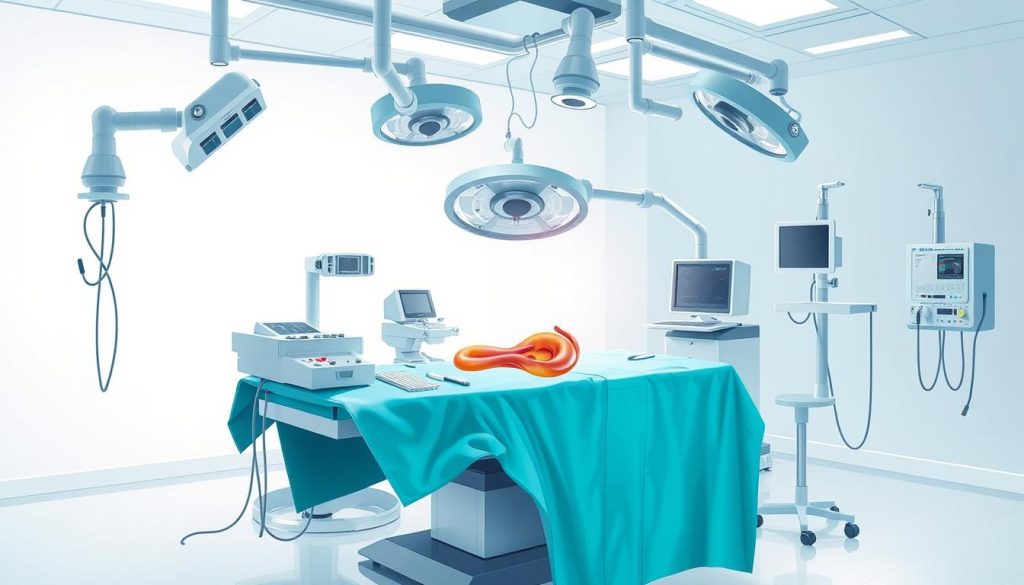
Complications of Untreated Hiatal Hernias
Not treating a hiatal hernia can cause serious problems:
- Chronic GERD, which can harm the esophagus
- Barrett’s esophagus, a condition that could lead to cancer
- Esophageal strictures, which narrow the esophagus
- Volvulus, a twisting of the stomach that can cut off blood supply
If you have ongoing symptoms or problems, talk to your doctor. They can decide if you need anti-reflux surgery or GERD surgery for your hiatal hernia.
Different Surgical Approaches for Hiatal Hernia Repair
Hiatal hernia surgery offers various options for patients seeking relief. The choice of procedure depends on factors like hernia size, patient health, and surgeon expertise.
Laparoscopic hernia repair is a minimally invasive technique. It uses small incisions and a camera to guide the surgeon. This method often leads to faster recovery times and less scarring.
Open surgery is another approach. It involves a larger incision in the abdomen or chest. While it may require longer healing, it’s sometimes necessary for complex cases.
Nissen fundoplication is a common procedure for hiatal hernia repair. It wraps the upper part of the stomach around the lower esophagus. This strengthens the barrier between the stomach and esophagus, reducing reflux symptoms.
Here’s a comparison of these surgical approaches:
| Surgical Approach | Incision Size | Recovery Time | Hospital Stay |
|---|---|---|---|
| Laparoscopic | Small (0.5-1 cm) | 2-3 weeks | 1-2 days |
| Open Surgery | Large (6-8 inches) | 4-6 weeks | 3-5 days |
| Nissen Fundoplication | Varies (can be laparoscopic) | 2-4 weeks | 1-3 days |
Choosing the right surgical approach is key for successful treatment. Your surgeon will discuss the best option based on your individual case. For more detailed information on hiatal hernia treatments, visit Medical News Today.
Preparing for Your Hiatal Hernia Surgery
Preparing for hernia or esophageal surgery needs careful planning. Your doctor will help you through several steps. This ensures the best outcome for you.
Required Medical Tests and Evaluations
Before your surgery, you’ll have to go through some tests. These include:
- Blood tests to check your overall health
- Chest X-rays to look at your lungs and heart
- Endoscopy to check your esophagus and stomach

Dietary and Lifestyle Changes Before Surgery
Your surgeon might suggest some changes before your surgery:
- Weight loss for overweight patients to reduce surgical risks
- Quitting smoking to improve healing
- Eating smaller, more frequent meals to manage symptoms
Medications to Stop Before the Procedure
Some medicines can affect your surgery. Your doctor might tell you to stop taking:
- Blood thinners like aspirin or warfarin
- Certain herbal supplements
- Non-steroidal anti-inflammatory drugs (NSAIDs)
Always follow your surgeon’s instructions closely. Proper preparation is key to a successful surgery and recovery.
The Nissen Fundoplication Procedure Explained
Nissen fundoplication is a common surgery for hiatal hernia and acid reflux. It aims to strengthen the lower esophageal sphincter. This prevents stomach contents from flowing back into the esophagus.
Steps of the Surgery
During Nissen fundoplication, the surgeon wraps the upper stomach around the lower esophagus. This creates a tight band to reinforce the sphincter muscle. The surgery involves these steps:
- Making small incisions in the abdomen
- Inserting a laparoscope and surgical instruments
- Moving the stomach back into its proper position
- Wrapping the stomach around the esophagus
- Closing the diaphragm opening
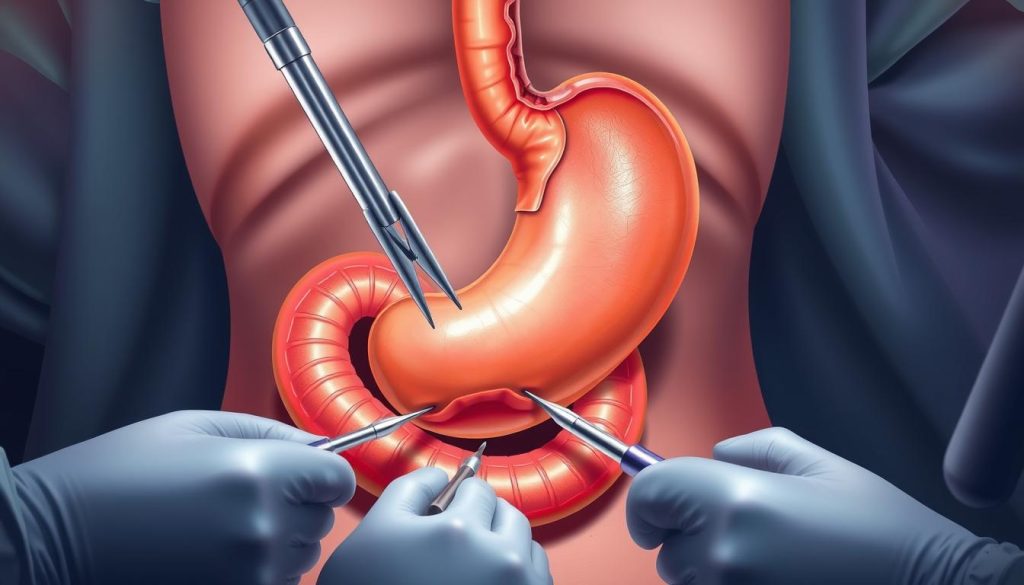
Benefits and Possible Risks
Nissen fundoplication has many benefits for those with acid reflux and hiatal hernias. It can greatly reduce symptoms and improve life quality. Some benefits include:
- Reduced acid reflux symptoms
- Improved swallowing
- Decreased reliance on medication
But, the surgery also has risks. These include difficulty swallowing, bloating, and possible hernia recurrence.
Expected Duration and Hospital Stay
The surgery usually takes 2-3 hours. Most patients stay in the hospital for 1-3 days after. Recovery time is about 2-3 weeks for most people.
Follow-up appointments are key to check on healing. They help ensure the success of the surgery.
Laparoscopic vs. Open Hiatal Hernia Surgery
Hiatal hernia surgery has changed a lot, with two main types: laparoscopic and open surgery. Laparoscopic surgery is more popular because it’s less invasive and you recover faster.
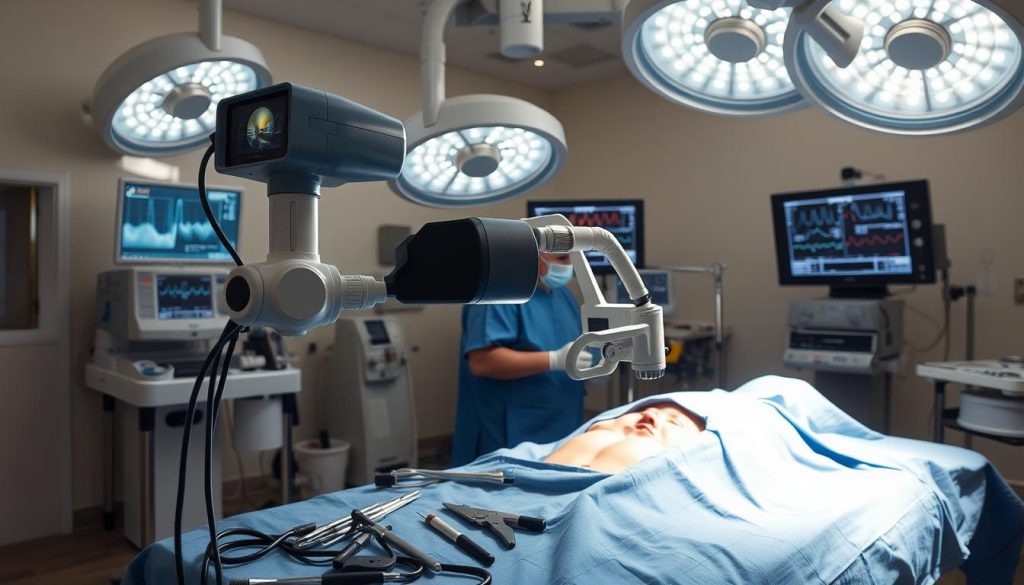
Laparoscopic surgery uses small cuts for a camera and tools. It has many benefits:
- Less pain after surgery
- Shorter time in the hospital
- Quicker to get back to daily activities
- Smaller scars
Open surgery, by contrast, needs a bigger cut in the belly or chest. It’s used for more complex cases but takes longer to heal and hurts more.
A study looked at death rates from laparoscopic and open surgeries. It found laparoscopic surgery has lower death rates, mainly for simple cases.
| Factor | Laparoscopic | Open |
|---|---|---|
| Incision size | Small (0.5-1 cm) | Large (10-20 cm) |
| Recovery time | 1-2 weeks | 4-6 weeks |
| Hospital stay | 1-3 days | 5-7 days |
Your doctor will look at your hernia size, health, and their skills to choose the best surgery for you. Talk to your doctor about the good and bad of each surgery to decide what’s best.
What to Expect During Your Hospital Stay
After your hiatal hernia repair or anti-reflux surgery, you’ll spend time in the hospital. This is important for your recovery. It helps you get back to your daily life smoothly.
Immediate Post-operative Care
Right after surgery, you’ll go to a recovery room. Nurses will check your vital signs and help with any discomfort. Once you’re stable, you’ll move to a hospital room for a few days.
Pain Management Protocol
Your comfort is a top priority. You might get pain medication through an IV or use patient-controlled analgesia. This lets you control your pain. Your care team will check your pain often and adjust your treatment as needed.
Initial Recovery Phase
In the first 24-48 hours after surgery, you’ll start moving and drinking clear liquids. As you heal, you’ll move to a soft diet. Most patients stay in the hospital for 2-3 days.
- Day 1: Rest, pain management, and breathing exercises
- Day 2: Start walking short distances and sipping clear liquids
- Day 3: Progress to soft foods and prepare for discharge
Before you leave the hospital, your doctor will give you instructions for home care. They’ll also schedule follow-up appointments. Remember, everyone recovers differently. Your stay might be shorter or longer based on your needs.
Recovery Timeline After Hiatal Hernia Surgery
Recovering from hiatal hernia surgery, like nissen fundoplication, takes time and patience. Everyone’s journey back to health is different. This depends on their fitness level and the type of GERD surgery they had.
In the first few days after surgery, patients usually stay in the hospital. This time is for managing pain and making sure they heal right. Most people go home in 2-3 days, ready to recover in a place they know.
The first weeks at home are very important. Patients must follow their doctor’s advice closely. This often includes:
- Resting and avoiding hard activities
- Eating only liquids or soft foods
- Taking the medicines they’re prescribed
- Doing light walking exercises
As weeks go by, patients can start doing more. Many can go back to work in 2-4 weeks, depending on their job. It’s vital to listen to your body and not rush the healing.
It can take 6-8 weeks to fully recover from nissen fundoplication or other GERD surgeries. During this time, symptoms usually get better slowly. Regular check-ups with the doctor help make sure everything is healing well.
Keep in mind, every recovery is different. Some people might heal faster, while others need more time. Being patient and following the doctor’s instructions are essential for a good recovery after hiatal hernia surgery.
Post-Surgery Diet and Nutrition Guidelines
After a hernia operation or esophageal surgery, your diet is very important. It helps prevent problems and aids in healing. Let’s look at the different stages of diet, foods to avoid, and good eating habits for a smooth recovery.
Dietary Progression Stages
Your diet will get better slowly after surgery:
- Clear liquids (water, broth)
- Full liquids (smoothies, yogurt)
- Soft foods (mashed potatoes, cooked vegetables)
- Regular diet (as tolerated)
Foods to Avoid
Stay away from these foods for a few weeks after surgery:
- Carbonated beverages
- Spicy foods
- Fatty or fried foods
- Tough meats
- Raw vegetables
Recommended Eating Habits
Follow these habits to help your recovery:
- Eat smaller, frequent meals
- Chew food thoroughly
- Stay upright for 30 minutes after eating
- Drink fluids between meals, not with food
Proper nutrition is essential for healing after esophageal surgery. Stick to your doctor’s advice and listen to your body as you move through the diet stages.
Physical Activity and Exercise Recommendations
After hiatal hernia surgery, it’s important to be gentle with your body. You need time to heal, but some movement is good. Start with short walks around your home or hospital room.
As you get better, you can walk more and farther. But for the first few weeks, don’t lift anything over 10 pounds. This helps avoid putting too much pressure on your surgery site.
As you get stronger, you can do light exercises. These can help strengthen your core and improve your posture.
- Week 1-2: Short walks, light stretching
- Week 3-4: Longer walks, gentle yoga
- Week 5-6: Low-impact exercises, swimming
- Week 7-8: Gradual return to normal activities
Your surgeon will give you specific instructions. They might suggest exercises just for you. These can help your body heal and might even lower your chance of acid reflux coming back.
Pay attention to how your body feels. If something hurts or feels off, stop and talk to your doctor. With time and effort, most people can get back to their usual exercise routine in 2-3 months.
| Exercise Type | Benefits | When to Start |
|---|---|---|
| Walking | Improves circulation, prevents blood clots | Immediately after surgery |
| Swimming | Low-impact, full-body workout | 4-6 weeks post-surgery |
| Yoga | Enhances flexibility, strengthens core | 3-4 weeks post-surgery (gentle) |
| Weight training | Builds strength, improves metabolism | 8-12 weeks post-surgery (light weights) |
Potential Complications and Warning Signs
After hiatal hernia or diaphragmatic hernia repair, patients should watch for complications. Spotting warning signs early helps in getting timely treatment. This can lead to better recovery outcomes.
Common Post-operative Complications
Some issues after hiatal hernia repair include trouble swallowing, gas bloating, and nausea. These usually go away in a few weeks. You might also feel temporary chest pain or shoulder discomfort from the surgery.
When to Contact Your Healthcare Provider
Call your doctor if you notice:
- Persistent pain not helped by medicine
- Fever over 101°F (38.3°C)
- Difficulty breathing or feeling short of breath
- Constant nausea or vomiting
- Can’t eat or drink
Emergency Warning Signs
Get medical help right away for:
- Severe chest pain or pressure
- Sudden, severe stomach pain
- Coughing up blood
- Signs of infection at the cut site
| Complication | Frequency | Action Required |
|---|---|---|
| Difficulty swallowing | Common | Monitor, contact doctor if persistent |
| Gas bloating | Common | Dietary adjustments |
| Infection | Rare | Immediate medical attention |
| Hernia recurrence | Uncommon | Follow-up with surgeon |
Talking to your healthcare provider quickly is key. It helps in handling any issues or complications early. This ensures the best recovery after your surgery.
Long-term Lifestyle Changes After Surgery
After anti-reflux or GERD surgery, patients must make lasting lifestyle changes. These changes are key to preventing symptoms from coming back. They also improve your overall quality of life.
Eating smaller, more frequent meals is essential. This reduces pressure on the repaired area. It also lowers the risk of reflux symptoms.
Managing your weight is also important. Extra weight can put pressure on your stomach and esophagus. This can undo the benefits of the surgery. Regular exercise and a balanced diet help keep a healthy weight.
- Avoid trigger foods like spicy, acidic, or fatty items
- Eat slowly and chew food thoroughly
- Stay upright for at least two hours after meals
- Quit smoking and limit alcohol consumption
Stress reduction techniques can prevent digestive symptoms from flaring up. Meditation, yoga, or deep breathing exercises can help. Getting enough sleep is also important for your health and digestion.
| Lifestyle Change | Benefits |
|---|---|
| Smaller, frequent meals | Reduces pressure on stomach and esophagus |
| Weight management | Decreases strain on surgical repairs |
| Stress reduction | Minimizes digestive symptom flare-ups |
| Improved sleep habits | Enhances overall health and recovery |
By sticking to these long-term lifestyle changes, patients can get the most out of their GERD surgery. They can enjoy lasting relief from symptoms.
Follow-up Care and Monitoring
After hiatal hernia surgery, your recovery journey continues with important follow-up care. Your surgeon will book several appointments to check on your healing. These visits happen at set times over the first few months after surgery.
At these check-ups, your doctor will look at your incision sites, if you had laparoscopic hernia repair. They’ll watch for any signs of infection or problems. You might have tests to see how well the surgery worked, like:
- Barium swallow studies
- Endoscopy
- pH monitoring
It’s key to go to all your scheduled appointments and talk openly with your healthcare team. Tell them about any unusual symptoms or worries right away. Most people get back to regular health care in 3-6 months after surgery.
Remember, your active role in follow-up care is very important for long-term success. By being careful and following your doctor’s advice, you can get the most out of your surgery. This will help improve your life quality.
Success Rates and Quality of Life Improvements
Hiatal hernia surgery, like the Nissen fundoplication, has shown great results. Studies say 80-90% of patients see big improvements. They feel less heartburn, less regurgitation, and can swallow better.
Most patients keep feeling better for years after surgery. Only 5-10% of patients might need another surgery within five years. But, this is rare.
Many patients enjoy better sleep and more freedom in their diet after surgery. They can enjoy meals more. A study showed 85% of patients were very happy with their results. They felt better in their daily lives and overall health.
Even though surgery is effective, results can differ. Some might have minor side effects or not feel completely better. It’s key to talk to a doctor about what to expect before deciding on surgery.
FAQ
Q: What is hiatal hernia surgery?
A: Hiatal hernia surgery fixes a weak spot in the diaphragm. This allows the stomach to move up into the chest. The most common surgery, Nissen fundoplication, wraps the stomach around the esophagus. This strengthens the barrier between the stomach and esophagus.
Q: When is hiatal hernia surgery necessary?
A: Surgery is needed when other treatments don’t work or when complications happen. This includes severe GERD, large hernias, or stomach strangulation.
Q: What are the different surgical approaches for hiatal hernia repair?
A: There are two main ways to repair a hiatal hernia. Laparoscopic surgery uses small incisions. Open surgery needs a bigger cut, usually for complex cases.
Q: How long does recovery take after hiatal hernia surgery?
A: Recovery time varies. Laparoscopic surgery patients can get back to normal in 2-3 weeks. Open surgery patients might need 4-6 weeks. It can take months for full recovery.
Q: What dietary changes are necessary after hiatal hernia surgery?
A: Patients start with clear liquids and soft foods. They gradually move to a normal diet over weeks. Eating smaller meals and avoiding trigger foods is also important.
Q: What are the possible complications of hiatal hernia surgery?
A: Complications can include swallowing problems, gas bloat, and hernia return. Damage to organs, infection, and anesthesia reactions are also possible. Talk to your surgeon about these risks.
Q: How successful is hiatal hernia surgery in treating GERD?
A: Surgery, like Nissen fundoplication, often greatly improves GERD symptoms. About 90% of patients see big improvements. But success can vary based on individual factors and the surgery type.
Q: Can a hiatal hernia recur after surgery?
A: Recurrence is possible, affecting 5-10% of laparoscopic repair patients. Obesity, coughing, and heavy lifting can increase this risk. Following post-op instructions and staying healthy can help prevent recurrence.
Q: How soon can I return to work after hiatal hernia surgery?
A: Return to work time varies by surgery type and job demands. Sedentary jobs after laparoscopic surgery might allow for 1-2 weeks off. More demanding jobs or open surgery may require 4-6 weeks. Always follow your surgeon’s advice.
Q: What lifestyle changes are necessary after hiatal hernia surgery?
A: Long-term changes include staying healthy, avoiding big meals, and not lying down after eating. Quitting smoking and managing stress are also key. These habits help prevent hernia return and maintain surgery benefits.












